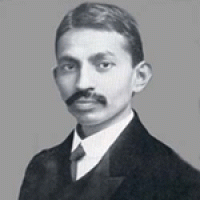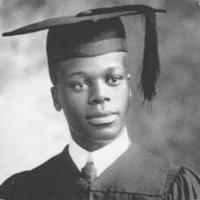Today in Kimberley's History
|
|
|
|
.
|
Gandhi is forcibly removed from a whites-only train carriage in Pietermaritzburg - 1893
On 7 June 1893, M.K Gandhi, later known as "The Mahatma" or "Great Soul" was forcibly removed from a whites-only carriage on a train in Pietermaritzburg, for not obeying laws that segregated each carriage according to race. Gandhi was practising as a young Indian lawyer in South Africa at the time, and this event proved a remarkable influence on the future of his political life. Gandhi was later instrumental in protesting against policies of segregation in South Africa in the early 1900s, especially against those that concerned Indians. This segregation did not only affect where Indians could live or work, but also made it compulsory for them to pay a £3 poll tax. Gandhi implemented strategies of passive resistance to protest against these policies. This passive resistance movement influenced civil rights movements all over the world, and was known as Satyagraha, or the "force which is born of Truth and Love or non-violence". Gandhi trained many Indians in this form of protest, and many were jailed for their activities, including Gandhi himself. |
|
ANC co-founder and journalist Pixley Seme dies - 1951
Pixley ka Isaka Seme died in Johannesburg on 7 June 1951. He was a political activist, journalist, lawyer and a co-founder of the African National Congress (ANC). His funeral service was conducted by the bishop of Johannesburg, Ambrose Reeves, on 17 June. Tributes were made by, among others, Chief Albert Luthuli, A. B. Xuma, Z. K. Matthews and D. D. T. Jabavu, a representative of the Swazi monarch and the secretary of native affairs. When a tombstone was unveiled at his grave in 1984 Mangosuthu Buthelezi spoke. As a young man Buthelezi had written letters dictated by Seme when he was unable to write after losing an eye in an operation, Buthelezi's mother was Seme's first wife's half-sister. Seme's wife Harriet was a daughter of King Dinizulu of Zululand. He was survived by four sons and a daughter. |
President F.W. de Klerk lifts the state of emergency - 1990
On 7 June 1990, former South African President, F W de Klerk, announced the end of South Africa’s four year old state of emergency. Immediately after that, he imposed new state of emergency in Kwazulu. Natal. The announcement was made following political uncertainty for de Klerk and his ruling National Party. The release of Nelson Mandela from prison and the unbanning of the African National Congress and the promise to end apartheid created fear among Whites. The White House (in America) praised de Klerk’s decision as a good move towards creating a climate conducive to negotiations that will lead to democratic, non-racial South Africa. Nelson Mandela was in Paris on the second leg of an international tour when De Klerk announced the lifting of state of the emergency. Nelson Mandela expressed that the state of emergency was not lifted in Natal where political violence between the ANC and Inkatha Freedom Party (IFP) supporters led to the deaths of 4 000 blacks over the previous four years. The state of emergency restrictions gave South African security forces authority to detain people for extended periods of time without being formally charged with a crime and it gave the security forces more powers to quell disorders, restrict dissent and restrict press coverage.
On 7 June 1990, former South African President, F W de Klerk, announced the end of South Africa’s four year old state of emergency. Immediately after that, he imposed new state of emergency in Kwazulu. Natal. The announcement was made following political uncertainty for de Klerk and his ruling National Party. The release of Nelson Mandela from prison and the unbanning of the African National Congress and the promise to end apartheid created fear among Whites. The White House (in America) praised de Klerk’s decision as a good move towards creating a climate conducive to negotiations that will lead to democratic, non-racial South Africa. Nelson Mandela was in Paris on the second leg of an international tour when De Klerk announced the lifting of state of the emergency. Nelson Mandela expressed that the state of emergency was not lifted in Natal where political violence between the ANC and Inkatha Freedom Party (IFP) supporters led to the deaths of 4 000 blacks over the previous four years. The state of emergency restrictions gave South African security forces authority to detain people for extended periods of time without being formally charged with a crime and it gave the security forces more powers to quell disorders, restrict dissent and restrict press coverage.
ANC wins the second democratic election - 1999
The African National Congress won the second democratic election by 266 seats. The Democratic Party, which became the new official opposition, won 38 seats, followed by the Inkatha Freedom Party with 34 and the former official opposition, the New National Party, won only 28 seats.
The African National Congress won the second democratic election by 266 seats. The Democratic Party, which became the new official opposition, won 38 seats, followed by the Inkatha Freedom Party with 34 and the former official opposition, the New National Party, won only 28 seats.


